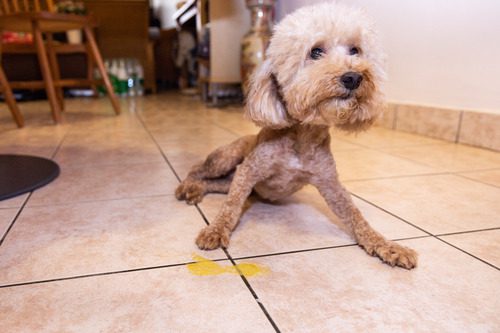Dog Throwing Up Yellow: What Does It Mean?
It’s never a good feeling to see your dog vomit, especially when the vomit is bright yellow. You might wonder what it means, whether it’s serious, and if your dog needs medical attention right away. Yellow vomit can be surprising, but it often tells us something about what’s happening inside your pet’s digestive system. Some causes are simple and manageable, while others may need a closer look from your veterinarian. This blog breaks down the potential reasons behind a dog throwing up yellow, what to watch for, and when to reach out for help, so you can feel more informed and better prepared to support your pet. If your dog is throwing up yellow, contact Warrick Veterinary Clinic in Warrick County, IN, at (812) 897-4855 to schedule an evaluation.

What Does It Mean When a Dog Is Throwing Up Yellow?
Yellow vomit in dogs often means bile is present. Bile is a digestive fluid produced by the liver and stored in the gallbladder. It helps break down fats during digestion and is usually released into the small intestine. If your dog is throwing up yellow bile, it typically means they are vomiting on an empty stomach. However, bile vomit can also indicate gastrointestinal irritation, dietary issues, or more serious health conditions.
Bile and the Digestive Process
When a dog hasn’t eaten for a while, bile can build up in the stomach and irritate the lining. This irritation may trigger vomiting. This is one of the more common and less worrisome reasons for yellow vomit. It’s often seen in the morning or after long periods without food. Still, regular or repeated episodes shouldn’t be ignored, as they can lead to further complications.
Common Causes of Yellow Vomit in Dogs
There are several reasons a dog may vomit yellow bile. Some causes are relatively mild, while others require prompt veterinary attention. Understanding these possibilities can help guide your next steps.
Hunger or an Empty Stomach
Dogs that go too long without eating may throw up yellow bile. This is especially common in dogs fed only once a day or in the morning before breakfast. If the vomiting happens first thing in the morning but your dog is otherwise healthy, this could be the cause.
Dietary Indiscretion
Dogs are curious creatures and often eat things they shouldn’t such as table scraps, grass, garbage, or non-food items. Ingesting something unusual or irritating can upset the stomach and lead to bile vomiting. If your dog has recently gotten into something they shouldn’t have, this could be the trigger.
Food Sensitivities or Sudden Diet Changes
A change in food or a new treat might not agree with your dog’s digestive system. Food intolerance or sensitivity can result in stomach upset, leading to vomiting. Always introduce new foods gradually to help prevent this reaction.
Gastrointestinal Diseases
Yellow vomit can also be associated with more serious conditions like gastroenteritis, inflammatory bowel disease, or pancreatitis. These conditions often involve inflammation of the stomach or intestines and require a veterinary diagnosis.
Bilious Vomiting Syndrome (BVS)
This condition occurs when bile leaks into the stomach from the small intestine, especially after periods of fasting. Dogs with BVS may vomit yellow bile routinely, especially in the early morning or late at night. While this condition can be managed, it should first be diagnosed by your veterinarian.
Liver or Gallbladder Problems
Since bile is produced by the liver and stored in the gallbladder, any issue with these organs can affect bile flow and potentially lead to vomiting. If your dog is frequently throwing up yellow and also showing signs like lethargy, poor appetite, or weight loss, liver disease or gallbladder issues may be involved.
When You Should Contact Your Veterinarian
A single episode of yellow vomiting might not be cause for alarm. But if it happens more than once, or if it’s paired with other symptoms, it’s time to call your veterinarian. Dogs are very good at hiding discomfort, so changes in behavior or appetite shouldn’t be overlooked.
Signs That Warrant Prompt Attention
Call Warrick Veterinary Clinic at (812) 897-4855 if you notice any of the following along with vomiting:
- Lethargy or weakness
- Refusal to eat or drink
- Blood in vomit or stool
- Diarrhea
- Repeated vomiting in a short period
- Swollen or painful abdomen
- Signs of dehydration (dry gums, sunken eyes)
What to Expect During a Veterinary Visit at Warrick Veterinary Clinic
Your veterinarian will start by gathering information about your dog’s symptoms, history, and diet. From there, they may recommend diagnostic tests to determine what’s causing your dog to vomit yellow bile.
Diagnostic Tools That May Be Used
- Physical Exam: To check for signs of pain, dehydration, or other abnormalities.
- Bloodwork: To assess organ function, especially the liver and pancreas.
- Fecal Exam: To rule out intestinal parasites.
- Imaging (X-rays or Ultrasound): To view the stomach, intestines, and other organs.
- Dietary Review: Your vet may ask detailed questions about your pet’s diet, feeding schedule, and access to inappropriate items.
Treatment Options Depend on the Diagnosis
Treatment for yellow vomit depends entirely on the underlying cause. For mild cases, such as those caused by an empty stomach or dietary indiscretion, simple adjustments may help. More complex causes may require ongoing management or medical intervention.
Supportive Care
In many cases, supportive care can help your dog feel better quickly. This may involve:
- Adjusting feeding times or frequency
- Feeding a bland or prescription diet
- Providing fluids for hydration
Medical Management
If the issue is related to an underlying condition like BVS or gastrointestinal disease, your vet may recommend medications to reduce stomach acid, manage inflammation, or improve digestion.
Ongoing Monitoring
Chronic or recurring vomiting often needs follow-up visits to track progress and adjust treatment as needed. Your vet will work with you to monitor your dog’s condition and make the necessary changes to improve their health.
Helping Your Dog Stay Comfortable and Healthy
If your dog is throwing up yellow, it’s important to pay attention and take action rather than waiting it out. Even when the cause is mild, ongoing vomiting can affect your dog’s quality of life and lead to dehydration or nutritional imbalances. Trust your instincts. If something feels off, reach out for support. At Warrick Veterinary Clinic, we’re here to help you understand your dog’s symptoms and determine what’s behind the vomiting. Whether it’s a simple fix or something more complex, our team is ready to evaluate your pet and guide you through the next steps. Give us a call at (812) 897-4855 to schedule an appointment.
